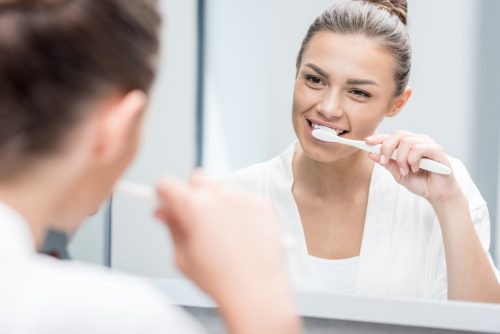 It’s unfortunate, but many patients think that their oral care routine is perfect, even without consulting their dentist first. Some of the techniques they use make sense at first, but once your dentist in Sewell finds out, he’s quite surprised.
It’s unfortunate, but many patients think that their oral care routine is perfect, even without consulting their dentist first. Some of the techniques they use make sense at first, but once your dentist in Sewell finds out, he’s quite surprised.
That’s why he wanted to address a few of the habits he often hears and explain what you should be doing instead. Keep in mind he’s happy that his patients are taking care of their mouths. He just wants to offer the best way to do it effectively and safely.
Brushing for Too Long
Patients might think that the longer they brush their teeth for, the more bacteria and dental plaque they’re removing. In reality, brushing any longer than three minutes can damage your tooth enamel. Damaged tooth enamel can cause the underlying dentin to become exposed, making teeth look more discolored. It can also increase your chances of developing tooth sensitivity.
Brushing with Too Much Force
Just like brushing for too long, people assume that if they brush harder, they can remove more plaque in less time. To give a better idea of how much pressure you should use, hold your toothbrush with only your thumb and index finger, then brush.
Instead of using more force, consider switching to an electric brush that uses a rotating head or sonic technology. These are proven to make removing plaque easier than a manual toothbrush.
Using the Wrong Bristle Strength
If you notice your gums receding or increased sensitivity after brushing, you may want to check if the bristles of your toothbrush are too hard. Some people prefer the feeling it has on their teeth as well as its effectiveness at removing plaque, but the cons of a hard-bristled toothbrush are more likely to outweigh the pros. If you’re unsure if a soft-bristled toothbrush is right for you, ask your dentist in Sewell for a recommendation.
Not Replacing Your Brush Often Enough
The American Dental Association recommends replacing your toothbrush (or toothbrush head if it’s electric) every three months. After regular use, the bristles can start to fray in multiple directions, reducing its effectiveness. A frayed toothbrush is not as effective at removing food particles and bacteria from in between teeth.
Assuming Electric is Better Than Manual
Electric toothbrushes are designed to make regular oral care easier, especially for those who have trouble using manual brushes due to physical impairments. They do not allow patients to brush for less time, nor do they allow them to brush less than the daily recommended number of two times a day. In the end, what matters most is the technique used to brush, regardless of the style of brush used.
Want to learn more tips on improving your oral care? Schedule an appointment with your dentist in Sewell today!
About the Author
Dr. Christopher J. Connolly earned his Doctor of Medicine in Dentistry degree at Fairleigh Dickenson University School of Dentistry. To provide the best dental care possible, Dr. Connolly regularly attends continuing education courses and maintains memberships in several dental organizations. To learn more about his practice, contact him at (856) 582-0090 or visit his website.


